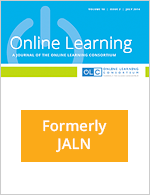Volume 14, Issue 2 - November 2010
Multiple Modes in Corporate Learning: Propelling Business IQ with Formal, Informal and Social Learning
Recognizing that the shifting corporate environment is placing ever greater stresses on learning organizations, this paper reports how companies are increasingly offering employees a wide choice of learning options beyond conventional classroom training, including online, social learning, and other modalities in “blended” programs. Identifying a number of trends—a multi-generational workforce,...
What Corporate Training Professionals Think About e-Learning: Practitioners’ Views on the Potential of e-Learning in the Workplace
An exploratory study of 954 mostly veteran workplace learning professionals sought to determine why respondents adopt e-learning. The results indicated that they see e-learning was most valuable for delivering instruction governing familiar company tasks, such as providing information about products, fulfilling compliance requirements, and securing standardization. While the results were...
Measuring Success and ROI in Corporate Training
When measuring outcomes in corporate training, the authors recommend that it is essential to introduce a comprehensive plan, especially when resources are limited and the company needs are vast. The authors hone in on five critical components for shaping a measurement plan to determine the success and ROI of training....
The Sloan-C Pillars: Towards a Balanced Approach to Measuring Organizational Learning
The Sloan Pillars have set the standard for university-wide online learning program assessment for more than a dozen years. In this paper, the authors propose the extension of the Pillars to corporate e-learning, offering an alternative to traditional enterprise learning assessments. Claiming that conventional methods stress individual courses or programs,...

